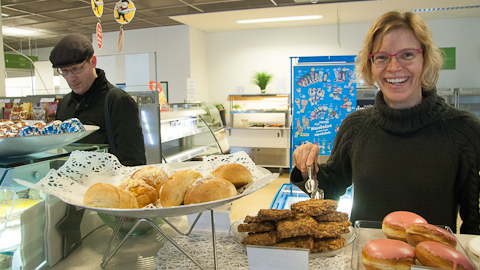The Department of Philosophy Appointed as the National Head of the UNESCO Bioethics Network
03.03.2014
The Department of Philosophy has been appointed as the head unit of the UNESCO Chair in Bioethics Network in Finland. The purpose of the network is to promote the education and research of medical bioethics. The strength of the University of Turku in bioethics is the long research tradition which is reflected by the Professorship of Medical Bioethics, the only one in Finland.

– If you want to uphold a certain ethical belief, bioethics can reveal which ethical beliefs to hold on to and which ones to give up, says Siipi. Her current research topic is food. A philosopher asks: what is ethically good food?
UNESCO Chair in Bioethics is an international network which has national chairs on five different continents. The establishment of the Finnish unit began when Rosa Rantanen, a Doctoral Candidate in Philosophy, took part in an international seminar of the network. A contact was made with UNESCO and the organisation contacted the Department of Philosophy to ask if they were willing to establish a national unit.
–The University of Turku has a long and strong history in bioethics research stretching all the way back to Juhani Pietarinen. The University of Turku is also the only university in Finland that has a professorship in medical ethics. Our multidisciplinary operations are particularly significant. Professor of Medical Ethics Veikko Launis is a professor in the Faculty of Medicine but works at the offices of the Department of Philosophy, says Docent Helena Siipi, who is a senior researcher in philosophy.
Crossing the Borders between Disciplines and Universities
Siipi is the Chairwoman of the newly established Finnish unit of the UNESCO Chair in Bioethics and the head secretary is Rosa Rantanen.
–The most essential part of the network is the international actions and cooperation. The operations are based on the researchers’ voluntary work and we have a lot of freedom in our actions on the national level. Our goal is to develop the research and education of medical bioethics, says Siipi.
Therefore she is very happy that, in addition to the researchers of medicine and philosophy, the Finnish unit also includes a student member, Bachelor of Medicine Tatu Kantonen.
–Our goal is to improve bioethical know-how. Patients, researchers and students will all benefit from it, says Siipi.
For now, the Finnish unit includes researchers of medicine and philosophy, but, in the future, the objective is to include researchers from other disciplines, such as legal science and theology, as well as researchers from other cities.
–At the moment, we are defining the goals of our operations and after that we will find a way to reach those goals, says Siipi.
UNESCO Chair in Bioethics will not increase the department’s resources but the organised operations will benefit the development of the field.
–The research of bioethics in Turku is already strongly international and multidisciplinary. What UNESCO brings to the table is regular and official cooperation, remarks Siipi.
Searching for a Logical Moral Structure
In bioethics, Siipi is fascinated by the opportunity to research the fundamental questions. What is right, what is wrong? What to think about, for example, euthanasia and the beginning and ending of life? What is good life and what is good care? How should medical research be carried out?
Last decades have raised the questions about cloning, the usefulness of gene tests and the development of genetic modification technology to prominence. When can the genetic modification technology be used and should the public be made aware of its use?
–We, the bioethics researchers at the University of Turku, are usually a little ahead of the current questions of the use of the technology in that, for example, at the moment we are considering the aspiration to improve human beings. It is not about treating a disease but a question of should humans be modified to being slightly better, more intelligent and more socially skilled, says Siipi.
At the moment, Siipi is researching moral perceptions about food, trying to answer questions such as: what kind of food should we eat and what is ethically good food?
The questions the researchers are trying to answer are big, but they do not usually even try to find only one ethical truth. Siipi tells how a philosopher constructs a deduction on how choices influence each other by reading research literature and by studying arguments.
–We are trying to discover an ethical system where the structure is as logical as possible. If we accept one thing, what follows? The goal is to find a consistent system of moral beliefs, says Siipi.
Erja Hyytiäinen